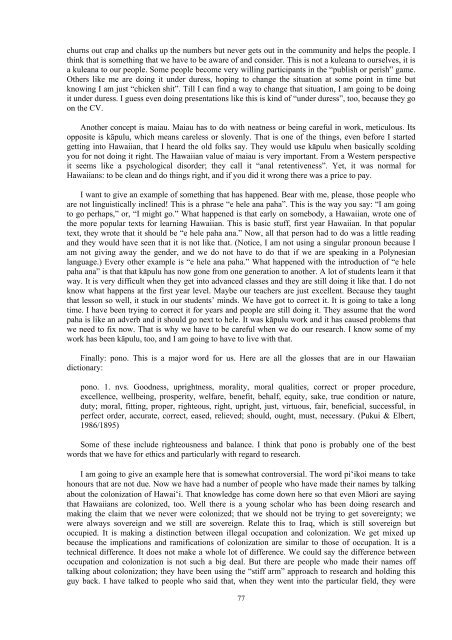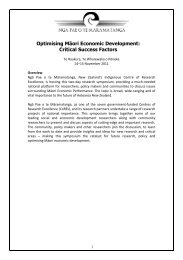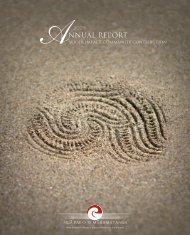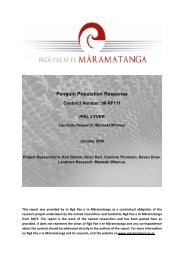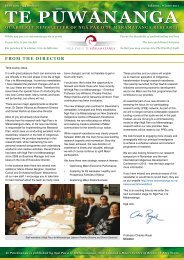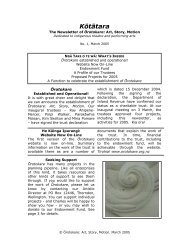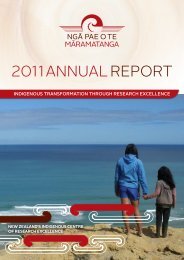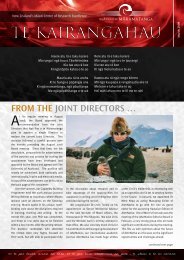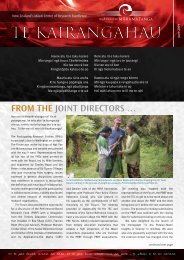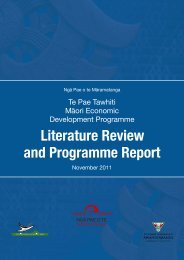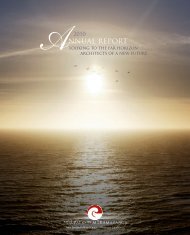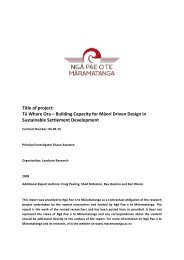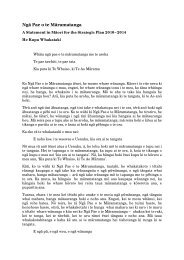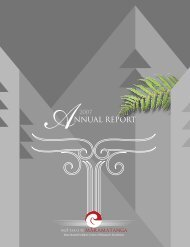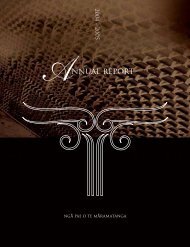traditional knowledge conference 2008 te tatau pounamu
traditional knowledge conference 2008 te tatau pounamu
traditional knowledge conference 2008 te tatau pounamu
Create successful ePaper yourself
Turn your PDF publications into a flip-book with our unique Google optimized e-Paper software.
churns out crap and chalks up the numbers but never gets out in the community and helps the people. Ithink that is something that we have to be aware of and consider. This is not a kuleana to ourselves, it isa kuleana to our people. Some people become very willing participants in the “publish or perish” game.Others like me are doing it under duress, hoping to change the situation at some point in time butknowing I am just “chicken shit”. Till I can find a way to change that situation, I am going to be doingit under duress. I guess even doing presentations like this is kind of “under duress”, too, because they goon the CV.Another concept is maiau. Maiau has to do with neatness or being careful in work, meticulous. Itsopposi<strong>te</strong> is kāpulu, which means careless or slovenly. That is one of the things, even before I star<strong>te</strong>dgetting into Hawaiian, that I heard the old folks say. They would use kāpulu when basically scoldingyou for not doing it right. The Hawaiian value of maiau is very important. From a Wes<strong>te</strong>rn perspectiveit seems like a psychological disorder; they call it “anal re<strong>te</strong>ntiveness”. Yet, it was normal forHawaiians: to be clean and do things right, and if you did it wrong there was a price to pay.I want to give an example of something that has happened. Bear with me, please, those people whoare not linguistically inclined! This is a phrase “e hele ana paha”. This is the way you say: “I am goingto go perhaps,” or, “I might go.” What happened is that early on somebody, a Hawaiian, wro<strong>te</strong> one ofthe more popular <strong>te</strong>xts for learning Hawaiian. This is basic stuff, first year Hawaiian. In that popular<strong>te</strong>xt, they wro<strong>te</strong> that it should be “e hele paha ana.” Now, all that person had to do was a little readingand they would have seen that it is not like that. (Notice, I am not using a singular pronoun because Iam not giving away the gender, and we do not have to do that if we are speaking in a Polynesianlanguage.) Every other example is “e hele ana paha.” What happened with the introduction of “e helepaha ana” is that that kāpulu has now gone from one generation to another. A lot of students learn it thatway. It is very difficult when they get into advanced classes and they are still doing it like that. I do notknow what happens at the first year level. Maybe our <strong>te</strong>achers are just excellent. Because they taughtthat lesson so well, it stuck in our students’ minds. We have got to correct it. It is going to take a longtime. I have been trying to correct it for years and people are still doing it. They assume that the wordpaha is like an adverb and it should go next to hele. It was kāpulu work and it has caused problems thatwe need to fix now. That is why we have to be careful when we do our research. I know some of mywork has been kāpulu, too, and I am going to have to live with that.Finally: pono. This is a major word for us. Here are all the glosses that are in our Hawaiiandictionary:pono. 1. nvs. Goodness, uprightness, morality, moral qualities, correct or proper procedure,excellence, wellbeing, prosperity, welfare, benefit, behalf, equity, sake, true condition or nature,duty; moral, fitting, proper, righ<strong>te</strong>ous, right, upright, just, virtuous, fair, beneficial, successful, inperfect order, accura<strong>te</strong>, correct, eased, relieved; should, ought, must, necessary. (Pukui & Elbert,1986/1895)Some of these include righ<strong>te</strong>ousness and balance. I think that pono is probably one of the bestwords that we have for ethics and particularly with regard to research.I am going to give an example here that is somewhat controversial. The word pi‘ikoi means to takehonours that are not due. Now we have had a number of people who have made their names by talkingabout the colonization of Hawai‘i. That <strong>knowledge</strong> has come down here so that even Māori are sayingthat Hawaiians are colonized, too. Well there is a young scholar who has been doing research andmaking the claim that we never were colonized; that we should not be trying to get sovereignty; wewere always sovereign and we still are sovereign. Rela<strong>te</strong> this to Iraq, which is still sovereign butoccupied. It is making a distinction between illegal occupation and colonization. We get mixed upbecause the implications and ramifications of colonization are similar to those of occupation. It is a<strong>te</strong>chnical difference. It does not make a whole lot of difference. We could say the difference betweenoccupation and colonization is not such a big deal. But there are people who made their names offtalking about colonization; they have been using the “stiff arm” approach to research and holding thisguy back. I have talked to people who said that, when they went into the particular field, they were77


